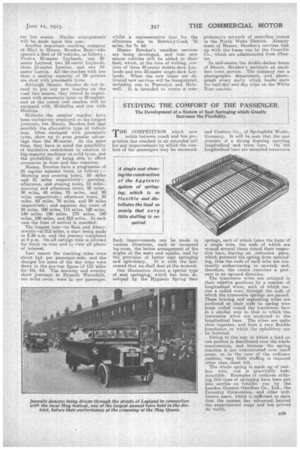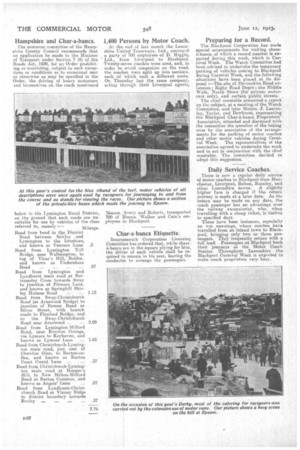STUDYING THE COMFORT OF THE PASSENGER.
Page 23

Page 24

If you've noticed an error in this article please click here to report it so we can fix it.
The Development of a System of Seat Springing which Greatly Increases the Flexibility.
THE COMPETITION which now exists between coach and bus proprietors has resulted in an extended call for any improvements by which the comfort of tho passengers May be increased.
Such improvements can be made in various directions, such as increased leg-room, the better arrangement of the angles of the seats and squabs, and by the provision of better seat springing
and upholstery. It is with the lastnamed that we shall deal at the moment.
Our illustration shows a special type of seat springing, which has been -oteveloped by the Hygienic Spring Seat
and Cushion Co., of Springfield Works, Coventry. It wilt be seen that the seat consists of a strong framing carrying longitudinal and cross bars. On the longitudinal bars are mounted transverse
springs each of which takes the form of a. single wire, the ends of which are wound several times round their respective bars, leaving an extension piece, which prevents the spring from unwinding, thus the ends of each wire are constantly endeavouring to unwind, and, therefore, the centre exercises a pressure in an upward direction.
The transverse wires are retained in their relative positions by a number of longitudinal wires, each of whigh carries a coiled wire, through the cells of which the transverse springs arepassed. These brachia and separating wires are
anchored at bracing ends to spring wire
loops coiled round the transverse bars in a similar way to that in which the transverse wires are anchored to thelongitudinal bars. The wires are quite close together, and form a very flexible foundation on Which the upholstery can be fastened.
Owing to the way in which a load on one portion is distributed over the whole construction, and because the spring reaction is not concentrated over smafl areas, as in the case of the ordinary cushion, very little stuffing is required other than sheet felt.
The whole spring is made up of rustless wire, and is practically hide= structible. Examples of cushions utilizing this type of springing have been put into service on vehicles run by the London General Omnibus Co., Ltd., the Coventry Corporation, and other wellknown users) which is sufficient to show that the system has advanced beyond the experimental stage and has proved its worth.
Hampshire and Char-a-bancs.
The motorcar committee of the Hampshire County Council recommends that an application be made to the Minister of Transport under Section 7 (4) of the Roads Act, 1920, for an Order prohibiting or restricting, subject to such exceptions or conditions as to occasional user or otherwise as may be specified in the Order, the driving of heavy motorcars and locomotives on the roads mentioned below in the Lymington Rural District, on the ground that such roads are unsuitable for use by vehicles of the class referred to, namely Road from bend in the District Road between SOWley and Lymington to the foreshore, and known as Tanners Lane .5 Road from Lymington Toll Bridge, near Walhampton, to top of Vicar's Hill, Boldre, and known as lindershore Road from Lymington and Lyndhurst main road at Bat • to junction of Pitmore Lane, tramsley Cross towards Sway and known as Springhill Shir ley Holmes Road 1.13 Road from Sway-Christchurch Road (at Arnewood Bridge) to junction of Roman Road at Silver Street, with branch roads to Flexford Bridge, and to the Sway-Christchurch Road near Arnewood ... 2.00 Road from Lymington-Milford Road, near Everton Orange, via Lymore to Keyhaven, and known as Lymore Lane ... 1.65 Road from Christchurch-Lymington main road, just east of Chen-ton Glen, to Barton-onSea, and known as Barton Coast Guard Lane ... ... .37 Road from Christchurch-Lymington main road at Hooper's Hill, to New Milton-Milford Road at Barton Common, and known as Angels' Lane ... .87 Road from Lyndhurst-Christchurch Road at Vinney Ridge to district boundary towards Burley ... .37
1,400 Persons by Motor Coach.
At the end of last month the Lancashire United Tramways, Ltd:, conveyed • a party of 700 employees of D. Higgin, Ltd., from Liverpool to Blackpool. Twenty-seven coaches were used, and, in order to avoid congestion on the road, the coaches were split up into sections, each of which took a different route. On Thursday last the same company, acting through their Liverpool agents,
Messrs. Avery and Roberts, transported 700 of Messrs. Walker and Cain's employees to Blackpool.
Char-a-bancs Etiquette.
Bournemouth Corporation Licensing Committee has ordered that, while charsa-banes are in the square plying for hire, the driver of each vehicle shall be required to remain'in his seat, leaving the conductor to arrange the passengers.
Preparing for a Record.
The Blackpool Corporation has made special arrangements for visiting charsii-banes, of which a record number is expected during this week, which is Carnival Week. The Watch Committee had been advised to undertake the temporary parking of vehicles coming to Blackpool during Carnival Week, mei the following; situations have been placed at its disposal :—The site of Devonshire Road extension; Rigby Road Depot ; the Middle Walk, North Shore (for private motorcars only), and certain public streete.
The chief constable presented a report on the subject, at a meeting of the Watch Committee, and later Messrs. J. Leavesley, Taylor, and Dewhurst, representing the Blackpool Char-a-hancs Proprietors' Association, attended and discussed with the committee the question of the taking over by the association of the arrangements for the parking of motor coaches and other motor vehicles during Carnival Week. The representatives of the association agreed to undertake the work and to act in conjunction with the chief constable. The committee decided to adopt this suggestion.
Daily Service Coaches.
There is now a regular daily service of motor coaches to Blackpool from Manchester, Liverpool, Bolton, Burnley., and other Lancashire towns. A slightly higher fare is charged if the return journey is made at a later date. As the return may be made on any date, the coach passenger has an advantage over the railway excursionist, who, when travelling with a cheap ticket, is limited to specified days.
There have been instances, especially on wet mornings, where coaches have travelled from an inland town to Blackpool, bringing only two or three passengers. They frequently return with a full load. Passengers at Blackpool book their journeys at the Motor Coach Station. Throughout Lancashire the Blackpool Carnival Week is expected to make coach proprietors very busy.






























